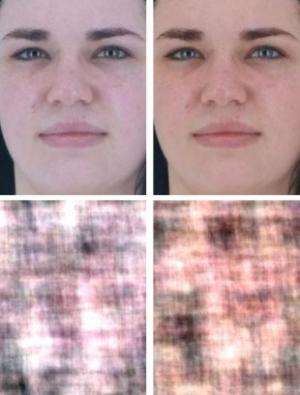Eat more vegetables for a healthy glow

(Medical Xpress)—Research published in the Royal Society journal Biology Letters has found that yellower skin tones resulting from a fruit and vegetable rich diet can make us more attractive.
Scientists have found in the past that yellower hues in skin tone are found, cross-culturally, to be more attractive and are also perceived to indicate better health. The team of researchers who conducted the study published today have determined that the factors are linked and suggest that our preference for yellower skin hues could be the result of being able to pick up on subtle indications of good health in potential partners.
Vibrantly coloured fruit and vegetables like tomatoes and carrots contain carotenoids which behave as antioxidants in blood plasma, aiding the immune system. Low levels of carotenoids are often found in people suffering from parasite infection or diseases like malaria. In contrast higher levels of carotenoids are associated with better health. As well as having health-giving properties the pigmented carotenoids in fruits and vegetables can subtly change skin tone giving it a more yellow hue.
A team of researchers led by Dr Carmen Lefevre at the University of York set out to determine if our preference for yellower skin tones is the result of humans being attuned to this signal of health or whether we have an aesthetic preference for yellow which evolved in a context unrelated to mating.
The researchers conducted a study with 56 volunteers. By digitally adjusting photos of 10 male and 10 female faces the team produced pairs of images to approximate high or low fruit and vegetable diets. The resulting pairs of faces were viewed in a random order by 30 of the study's volunteers who were asked to rate how attractive they found the faces. The remaining study participants were asked to rate how aesthetically pleasing they found the same 40 photos after they had been scrambled so they no longer resembled faces. The latter test was designed to help determine if volunteers preferred yellow in general or if their preference was limited to facial skin tones.
The team found that whilst faces which represented high carotenoid colour and high fruit and vegetable intake were found to be more attractive than the faces which represented a less healthy diet, there was no similar result found with the more abstract images. Despite volunteers preferring more healthy, yellow-toned faces, participants did not show a colour preference for either the healthily or un-healthily tinted images when they were presented with the scrambled photos.
The team suggest that their results show that our preference for healthy, yellower tones in faces is not the result of a pre-adapted preference for the colour yellow in general but that the results instead show we are attuned to subtle skin tone variations which indicate greater fruit and vegetable intake and better health in other people.
More information: "It is all in the face: carotenoid skin coloration loses attractiveness outside the face." C. E. Lefevre, M.P. Ewbank, A. J. Calder, E. von dem Hagen and D. I. Perrett. Biology Letters. dx.doi.org/10.1098/rsbl.2013.0633










.jpg)






